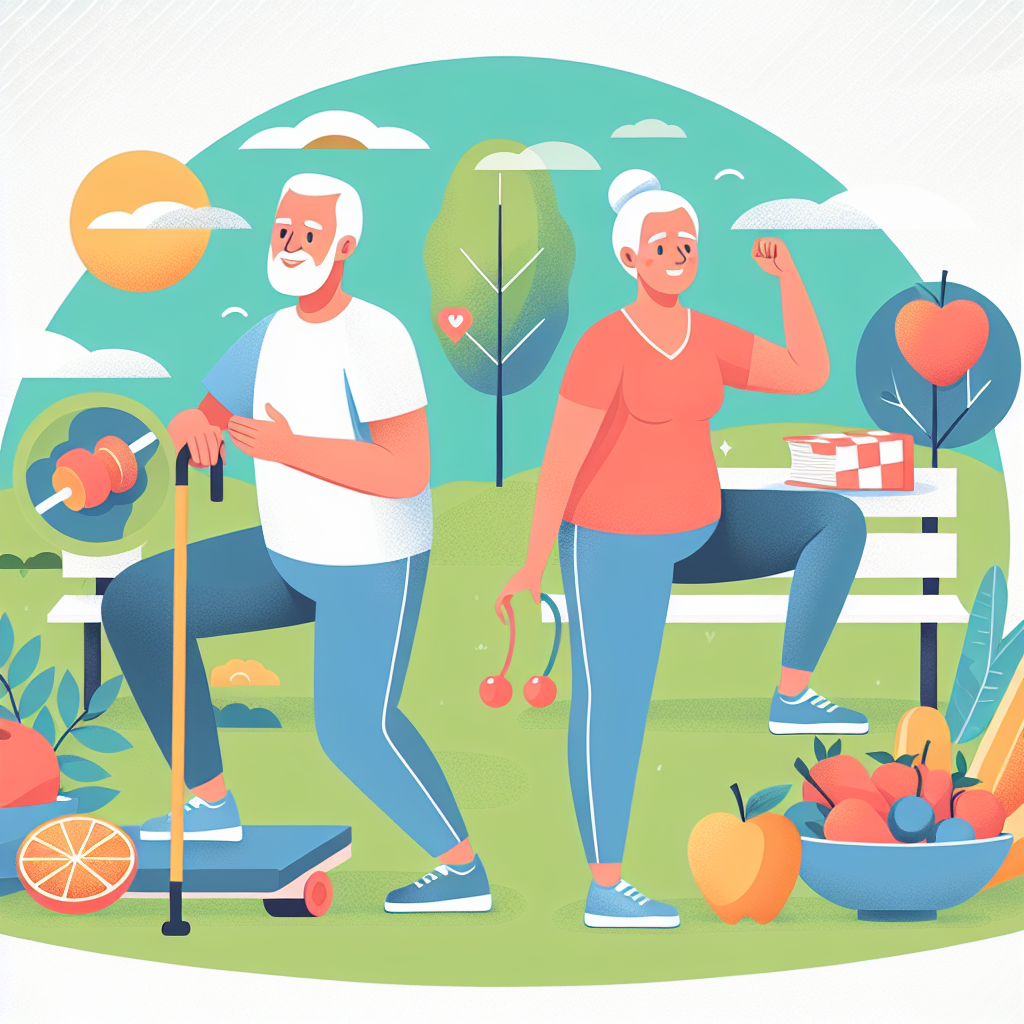Living a healthy lifestyle is important at any age, but it becomes even more crucial as we grow older. In this article, you will discover the top 10 tips for seniors to maintain their well-being and improve their overall health. From staying active and eating nutritious meals to getting enough rest and staying socially connected, these tips will help seniors embrace a vibrant and fulfilling lifestyle. Whether you’re a senior yourself or caring for an older loved one, these practical and friendly pieces of advice will guide you towards a healthier and happier life.

Physical Activity
Regular Exercise
Regular exercise is an essential component of maintaining a healthy lifestyle, especially as we age. Engaging in physical activity on a regular basis offers numerous benefits for overall well-being. Exercise helps to strengthen muscles and bones, increase flexibility and balance, improve cardiovascular health, and boost mood and mental clarity. Aim for at least 30 minutes of moderate-intensity exercise most days of the week, such as brisk walking, swimming, or biking. Remember to start slowly and gradually increase the intensity and duration of your workouts to avoid injuries and enjoy the long-term benefits of regular exercise.
Walking
One of the simplest and most accessible forms of physical activity for seniors is walking. Walking is a low-impact exercise that can be done virtually anywhere, whether it’s around the neighborhood, local parks, or even indoors on a treadmill. It is a great way to increase cardiovascular fitness, burn calories, and lower the risk of chronic conditions such as heart disease, diabetes, and stroke. Grab a comfortable pair of walking shoes, find a scenic route, and enjoy the fresh air and natural beauty while improving your overall health.
Strength Training
Strength training exercises are crucial for maintaining muscle mass, strength, and endurance as we age. Building and preserving muscle not only helps with everyday activities like carrying groceries or climbing stairs but also supports bone health and reduces the risk of falls and fractures. Incorporate resistance training into your exercise routine by using weights, resistance bands, or even your own body weight. Focus on working all major muscle groups, including the arms, legs, abdomen, and back, at least two times a week. Consult with a fitness professional or healthcare provider for personalized exercises that suit your needs and abilities.
Balance Exercises
Maintaining good balance is essential for preventing falls and preserving independence. Balance exercises can improve stability, coordination, and proprioception, reducing the risk of accidents and injuries. Simple activities such as practicing standing on one leg, heel-to-toe walking, or incorporating yoga or tai chi into your routine can help enhance balance and flexibility. Remember to start slowly and use a chair or safety equipment for support if needed. If you have any specific balance concerns or medical conditions, consult with a healthcare professional for guidance and personalized exercises.
Nutrition
Balanced Diet
Eating a balanced diet is key to maintaining optimal health and well-being as we age. A balanced diet includes a variety of foods from all food groups, providing essential nutrients, vitamins, and minerals. Aim to consume a combination of carbohydrates, proteins, healthy fats, and fiber in each meal. Incorporate whole grains, lean proteins, fruits, vegetables, and low-fat dairy products into your diet to ensure a well-rounded nutritional intake. Avoid excessive consumption of processed foods, sugary snacks, and saturated fats, as they can contribute to weight gain and increase the risk of chronic diseases.
Plenty of Fruits and Vegetables
Fruits and vegetables are rich in vitamins, minerals, and antioxidants that support a healthy immune system, promote good digestion, and reduce the risk of chronic diseases. Aim to include a variety of colorful fruits and vegetables in your daily meals and snacks. Consider fresh, frozen, or canned options, just ensure that if you choose canned, they are packed in water or their own juice and without added sugars or sodium. Include leafy greens, citrus fruits, berries, cruciferous vegetables, and colorful produce to maximize the nutritional benefits.
Whole Grains
Whole grains are an essential part of a healthy diet because they provide a good source of fiber, vitamins, and minerals. Choose whole grain options, such as whole wheat bread, brown rice, quinoa, and oats, instead of processed grains like white bread and refined cereals. Whole grains offer sustained energy, support digestive health, and can help lower the risk of chronic diseases such as type 2 diabetes, heart disease, and certain cancers. Opt for whole grain products whenever possible to increase your intake of important nutrients.
Protein Sources
Protein is a vital macronutrient that plays a critical role in maintaining muscle mass, supporting immune function, and promoting healthy aging. Include a variety of protein sources in your diet, such as lean meats, poultry, fish, eggs, beans, legumes, nuts, and seeds. These options provide essential amino acids and minerals necessary for overall health. Be mindful of portion sizes and choose low-fat and lean options to minimize saturated fat and cholesterol intake. Aim for about 20-30 grams of protein per meal to support muscle maintenance and repair.
Hydration
Staying hydrated is essential for maintaining overall health and well-being, particularly as we age. Water is vital for many bodily functions, including digestion, circulation, temperature regulation, and joint lubrication. Make sure to drink enough fluids throughout the day, even if you don’t feel thirsty. Aim for at least 8 cups (64 ounces) of fluids per day, and prioritize water as your main beverage. Limit the consumption of sugary drinks, caffeine, and alcohol, as they can dehydrate the body and contribute to various health issues. Keep a water bottle handy, set reminders to drink regularly, and sip fluids before, during, and after physical activity.
Weight Management
Maintaining a Healthy Weight
Maintaining a healthy weight is essential for overall wellness and can help prevent the onset of various chronic diseases. As we age, our metabolism naturally starts to slow down, making weight management a top priority. Aim for a body weight that is within the recommended range for your height and build. If you are overweight or obese, even modest weight loss can have significant health benefits. Talk to your healthcare provider or a registered dietitian for guidance on creating a personalized plan that includes a balanced diet and regular physical activity.
Portion Control
Portion control is a crucial factor in maintaining a healthy weight and preventing overeating. As we age, our caloric needs decrease, making it essential to pay attention to portion sizes to avoid unnecessary weight gain. Use smaller plates, bowls, and utensils to help visualize appropriate serving sizes. Pay attention to hunger and fullness cues, and be mindful of eating slowly and savoring each bite. By practicing portion control, you can enjoy a variety of foods while still maintaining a healthy weight and getting all the necessary nutrients.
Avoiding Crash Diets
Crash diets or extreme fad diets may promise rapid weight loss, but they are often unsustainable, unhealthy, and can have negative consequences on overall well-being. As we age, it becomes even more important to focus on long-term lifestyle changes rather than quick fixes. Crash diets can lead to nutrient deficiencies, muscle loss, and a higher likelihood of regaining weight once the diet is stopped. Instead, aim for gradual, sustainable weight loss by incorporating healthy eating habits, regular physical activity, and a balanced approach to weight management.
Sleep
Establish a Bedtime Routine
Establishing a consistent bedtime routine can greatly improve the quality and quantity of your sleep. Our bodies thrive on routine, so try to go to bed and wake up at the same time each day, even on weekends. Create a relaxing pre-sleep ritual that helps signal your body and mind that it’s time to wind down. This can include activities such as taking a warm bath, reading a book, practicing gentle stretching or deep breathing exercises, or listening to calming music. By following a consistent bedtime routine, you can optimize your sleep patterns and wake up feeling refreshed and energized.
Avoid Stimulants
Certain substances can interfere with your sleep and make it more difficult to fall asleep or stay asleep throughout the night. Avoid consuming stimulants such as caffeine and nicotine in the late afternoon and evening, as they can disrupt your sleep cycle. Be mindful of hidden sources of caffeine, such as chocolate, some medications, and certain sodas or energy drinks. Additionally, limit alcohol consumption before bedtime, as it can negatively impact the quality of your sleep. Instead, opt for decaffeinated beverages or herbal teas, and discuss with your healthcare provider any medications that may be affecting your sleep.
Create a Comfortable Sleep Environment
Creating a comfortable sleep environment can greatly enhance your ability to relax and enjoy a restorative night’s sleep. Ensure that your bedroom is cool, dark, and quiet to promote optimal sleep conditions. Consider blackout curtains or eye masks to block out any unwanted light, earplugs or white noise machines to mask any disruptive sounds, and a comfortable mattress and pillow that provide adequate support. Remove electronic devices and screens from your bedroom, as the blue light emitted from these devices can interfere with your sleep-wake cycle. By creating a serene and cozy sleep environment, you can optimize your chances of experiencing deep, uninterrupted sleep.

Stress Management
Engage in Relaxation Techniques
Engaging in relaxation techniques can help combat stress, promote relaxation, and improve overall well-being. Incorporate stress-busting activities into your daily routine, such as deep breathing exercises, meditation, mindfulness, or yoga. These practices can help calm the mind, reduce anxiety, and enhance your ability to cope with stressors. Find a relaxation technique that resonates with you and make it a regular part of your self-care routine. Consider joining local classes or using online resources to learn new techniques or find guided sessions that suit your abilities and preferences.
Practice Mindfulness
Mindfulness is the practice of being fully present in the moment and non-judgmentally observing your thoughts, feelings, and sensations. Incorporating mindfulness into your daily life can help reduce stress, improve focus and clarity, and enhance overall well-being. Start by setting aside a few minutes each day to engage in mindfulness exercises. This can include mindful breathing, body scans, or simply observing your surroundings with a sense of curiosity and acceptance. Cultivate an attitude of compassion and kindness towards yourself and others as you navigate the ups and downs of life.
Maintain Social Connections
Maintaining social connections is vital for mental and emotional well-being, as it provides a sense of belonging, support, and purpose. As we age, it’s important to prioritize staying socially engaged and nurturing relationships with family, friends, and the community. Reach out to loved ones regularly, whether through phone calls, video chats, or in-person visits if possible. Consider joining clubs, groups, or community organizations to meet new people and engage in shared interests. Volunteer for causes that resonate with you, as helping others can bring immense satisfaction and strengthen social connections.
Seek Support
It’s crucial not to hesitate in seeking support when needed. If you find yourself feeling overwhelmed, anxious, or struggling with managing stress, don’t hesitate to reach out to a mental health professional or counselor. They can provide guidance, support, and tools to help you effectively cope with stress and navigate life’s challenges. Asking for help is a sign of strength, and there is no shame in reaching out when you need it.
Preventive Healthcare
Regular Check-ups
Regular check-ups with healthcare professionals are essential for maintaining good health and preventing potential health issues. Schedule routine appointments with your primary care physician, dentist, and eye care specialist. These professionals can assess your overall health, manage chronic conditions, and detect early signs of potential health concerns. Maintain an open and honest dialogue with your healthcare providers, discussing any symptoms, concerns, or changes in your well-being. By actively participating in preventive healthcare, you can catch potential problems early and optimize your health outcomes.
Screenings and Vaccinations
Participating in recommended screenings and vaccinations is crucial for preventive healthcare. Screenings can detect the early signs of various diseases and conditions, such as cancer, high blood pressure, diabetes, and osteoporosis. Vaccinations are essential for protecting against infectious diseases, especially as our immune systems may weaken with age. Stay up to date with vaccinations, such as the flu shot, pneumonia vaccine, and shingles vaccine. Discuss with your healthcare provider which screenings and vaccinations are appropriate for you based on your age, sex, and medical history.
Medication Management
Proper medication management is vital for maintaining good health and preventing potential adverse drug interactions or side effects. Keep an updated list of all medications you are taking, including prescription drugs, over-the-counter medications, vitamins, and supplements. Ensure that your healthcare provider is aware of any changes in your medications and regularly review your medication regimen to avoid duplications or potential interactions. Follow the prescribed dosage and frequency, and never hesitate to clarify any questions or concerns you may have with your healthcare provider or pharmacist. Proper medication management is crucial for maintaining your health and overall well-being.

Cognitive Stimulation
Brain-Training Activities
Engaging in brain-training activities is an excellent way to keep your mind sharp and your cognitive abilities strong. Challenge your brain with puzzles, crosswords, Sudoku, or online brain-training apps that exercise memory, problem-solving, and critical thinking skills. Explore new hobbies, such as learning to play a musical instrument, painting, or trying your hand at cooking. By regularly stimulating your brain, you can enhance cognitive function and potentially reduce the risk of age-related cognitive decline.
Reading and Learning
Reading and learning are wonderful ways to expand your knowledge, enrich your imagination, and exercise your brain. Set aside time each day to indulge in books, magazines, or online articles on topics that interest you. Consider joining a book club or attending educational classes or seminars to engage in meaningful discussions and connect with others who share your interests. Lifelong learning not only stimulates the mind but also opens doors to new ideas, perspectives, and opportunities.
Socializing
Maintaining a robust social life is an essential aspect of cognitive stimulation and overall well-being. Socializing with friends, family, and community members can stimulate conversation, foster intellectual engagement, and provide opportunities for learning and personal growth. Schedule regular social outings, participate in group activities, or join clubs or organizations that align with your interests. Engage in meaningful conversations and actively listen to others, as these interactions can help keep your mind active, boost mood, and combat feelings of loneliness or isolation.
Safeguarding Physical Health
Fall Prevention
Falls can be a significant risk as we age, but taking proactive measures can help to prevent them and minimize potential injuries. Ensure that your home is free of hazards such as loose rugs, cluttered walkways, or poor lighting. Install grab bars in bathrooms and secure handrails on staircases to provide stability and support. Regularly evaluate your footwear, opting for non-slip soles and shoes that provide proper support. Engage in regular balance exercises and consider using assistive devices such as canes or walkers if necessary. By implementing fall prevention strategies, you can safeguard your physical health and reduce the risk of falls.
Regular Vision and Hearing Exams
Regular vision and hearing exams are essential for detecting and addressing any changes in your sensory function. Schedule routine appointments with your ophthalmologist and optometrist to monitor your eye health and update your eyeglass or contact lens prescription as needed. Similarly, consult with an audiologist or hearing healthcare professional to assess your hearing and discuss any potential interventions such as hearing aids or assistive devices. By prioritizing regular vision and hearing exams, you can maintain optimal sensory function and ensure early detection of any potential issues.
Proper Medication Storage
Proper storage and management of medications are critical for ensuring their safety and effectiveness. Keep medications in their original containers or blister packs and store them in a cool, dry place, away from direct sunlight and humidity. Follow any specific storage instructions provided by your pharmacist or healthcare provider, such as refrigeration requirements for certain medications. Keep medications out of the reach of children and pets. Regularly review your medication inventory, disposing of any expired or no longer needed medications according to proper disposal guidelines. By practicing proper medication storage, you can maintain the potency and safety of your medications.

Social Engagement
Participating in Community Activities
Participating in community activities is an excellent way to stay socially engaged, connect with others, and contribute to the community. Research local resources, community centers, or senior centers that offer events, workshops, or group outings. Engage in activities such as art classes, exercise programs, gardening clubs, or volunteer opportunities. These activities not only provide opportunities for personal growth and enjoyment but also foster a sense of belonging and purpose.
Joining Clubs or Groups
Joining clubs or groups related to your interests is a fantastic way to make new friends, engage in hobbies, and share common passions. Seek out local clubs or organizations that align with your hobbies or interests, whether it’s a book club, knitting circle, hiking group, or bridge club. Engaging with like-minded individuals in a supportive and friendly environment can provide a sense of camaraderie, intellectual stimulation, and opportunities for ongoing social interactions.
Volunteering
Volunteering is not only a meaningful way to give back to your community but also offers numerous health benefits for yourself. By volunteering your time and skills, you can make a positive impact on others’ lives, enhance your sense of purpose and fulfillment, and combat feelings of loneliness or isolation. Look for volunteer opportunities at local organizations, schools, hospitals, or animal shelters that resonate with your interests and passions. Volunteer work can range from mentoring younger individuals to supporting community events or providing assistance to those in need. By volunteering, you can stay active, engaged, and connected to your community while making a difference in the lives of others.
Maintaining Mental Well-being
Emotional Support
Emotional support plays a crucial role in maintaining mental well-being, particularly as we age. Cultivate a network of caring individuals, including family members, friends, or support groups who can provide empathy, understanding, and a safe space to share your thoughts and feelings. Reach out to loved ones regularly, express your emotions, and be open to seeking help when needed. Sharing your experiences and burdens can have a profound impact on your mental well-being and remind you that you are not alone on your journey.
Hobbies and Interests
Engaging in hobbies and interests is a fantastic way to boost your mental well-being and find joy in everyday life. Explore activities that make you feel alive and bring you a sense of fulfillment or enjoyment. It can be anything from gardening, painting, cooking, playing a musical instrument, or engaging in sports. Investing your time and energy in activities that bring you happiness can reduce stress, improve mood, and enhance overall mental well-being. Discover new hobbies or reconnect with old ones to nurture your passions and embrace your unique talents and interests.
Positive Outlook
Maintaining a positive outlook is a powerful tool for promoting mental well-being and overall happiness. Cultivate a mindset of gratitude, focusing on the positive aspects of your life and appreciating the small joys that surround you. Practice positive self-talk, nurturing self-compassion and being mindful of your inner dialogue. Engage in activities that uplift your spirits, such as listening to uplifting music, spending time in nature, or engaging in acts of kindness. By consciously choosing positivity, you can foster mental resilience, navigate challenges, and embrace a more joyful and fulfilling existence.
Avoiding Isolation
Avoiding isolation is crucial for maintaining mental well-being, as social connections play a vital role in our overall happiness and sense of belonging. Make an effort to reach out to loved ones regularly, whether through phone calls, video chats, or in-person visits if feasible. Seek opportunities for social engagement, such as participating in group activities, attending events, or joining clubs or organizations that align with your interests. If physical limitations or geographic constraints make it challenging to socialize in person, explore virtual communities or online forums where you can connect with others who share your hobbies or passions. By actively avoiding isolation, you can nurture your mental well-being and lead a more fulfilling life.
In conclusion, adopting a comprehensive approach to healthy living is key to maintaining overall well-being as we age. By incorporating regular exercise, balanced nutrition, weight management strategies, quality sleep, stress management techniques, preventive healthcare practices, cognitive stimulation, safeguarding physical health, social engagement, and mental well-being strategies into our daily lives, we can promote optimal health, vitality, and happiness. Remember, it’s never too late to start prioritizing your health and embracing a lifestyle that fosters longevity and quality of life.



